One key component that contributes to the overall success of a screenplay is the dialogue. In fact, it's one of the areas I had to score when completing coverage for a production company and judging scripts for Launch Pad screenwriting competitions. So, whether it's a producer or judge, what do these decision makers look for when it comes to dialogue? To name just a few, they look for dialogue that...
- Reveals character
- Furthers plot
- Feels authentic and dynamic
- Carries subtext
- Doesn't exist
Reveal Character
When analyzing the potential of a script, executives look at dialogue that reveals what characters are like and who they truly are. For example, in one of the early drafts of The Lego Movie, we read...
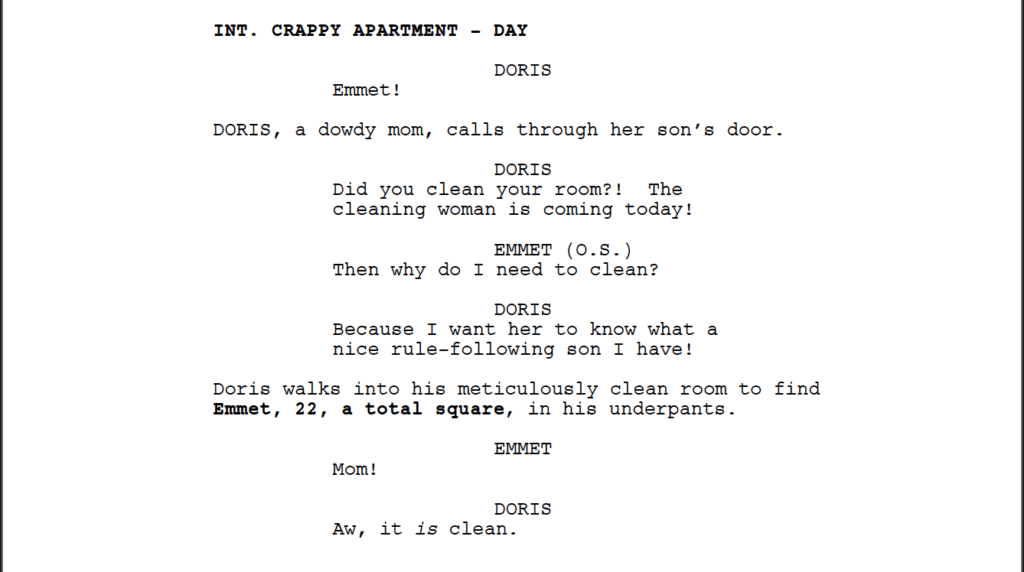
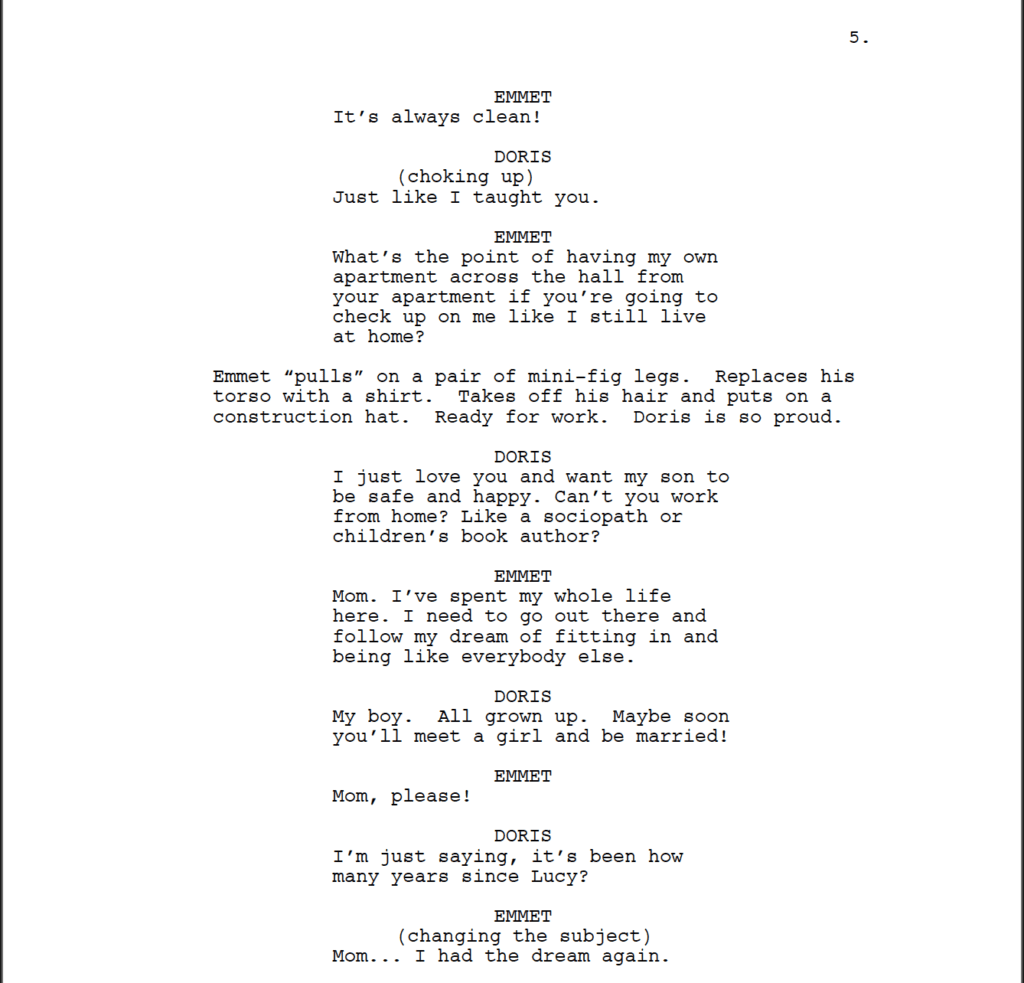
In just these few lines, we learn that Emmet: is the son of Doris, doesn't like his mom intruding in his space, always has a clean room, wants a level of independence, has a "dream of fitting in and being like everyone else," was in a relationship with a girl named Lucy that has since ended, and confides in his mom about a reoccurring dream.
Films/shows must connect with audiences. If your dialogue doesn't reveal character, then there can be no connection. And no connection can mean a pass on your script.
Further Plot
One of the worst things you can do in a script is make the plot stop progressing. It happens all the time... There's that conversation that sounds really cool in your head. There's that funny scene that is sure to create some great laughs. There's that speech that would make Shakespeare cry. But if it doesn't move the story forward (and/or reveal character), it's a waste.
Execs are looking for dialogue that moves the story forward, and a great example comes from a scene in Chernobyl, which centers on a trio tasked with covering the roof of an exploded nuclear reactor so they can stop radiation from spilling out and claiming lives...
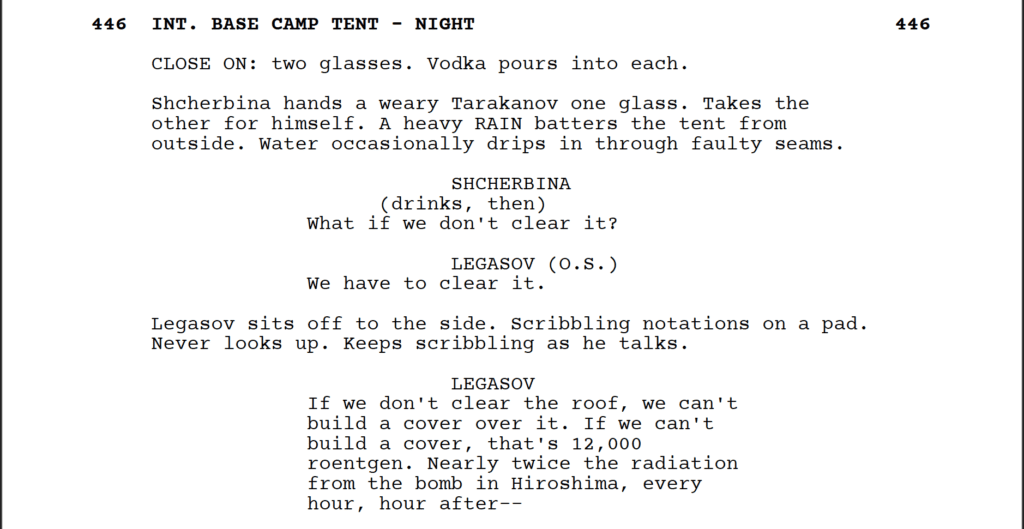
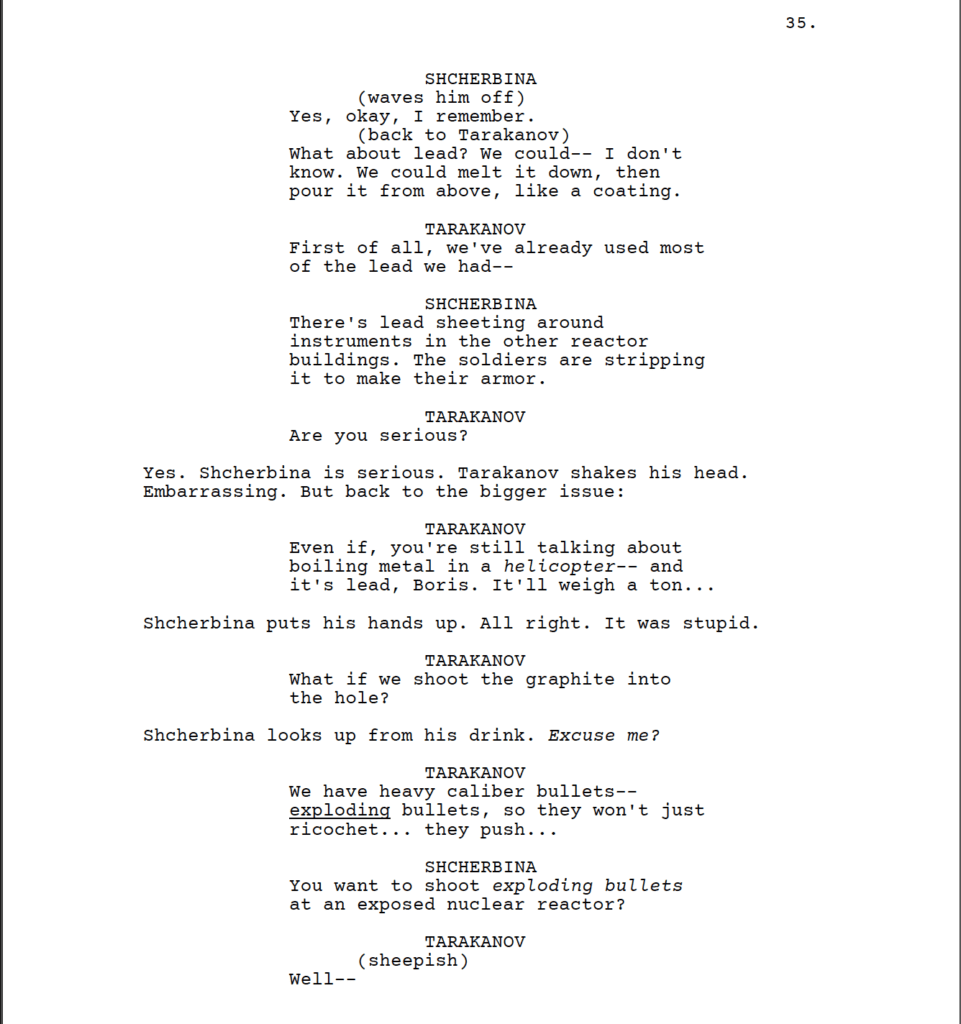
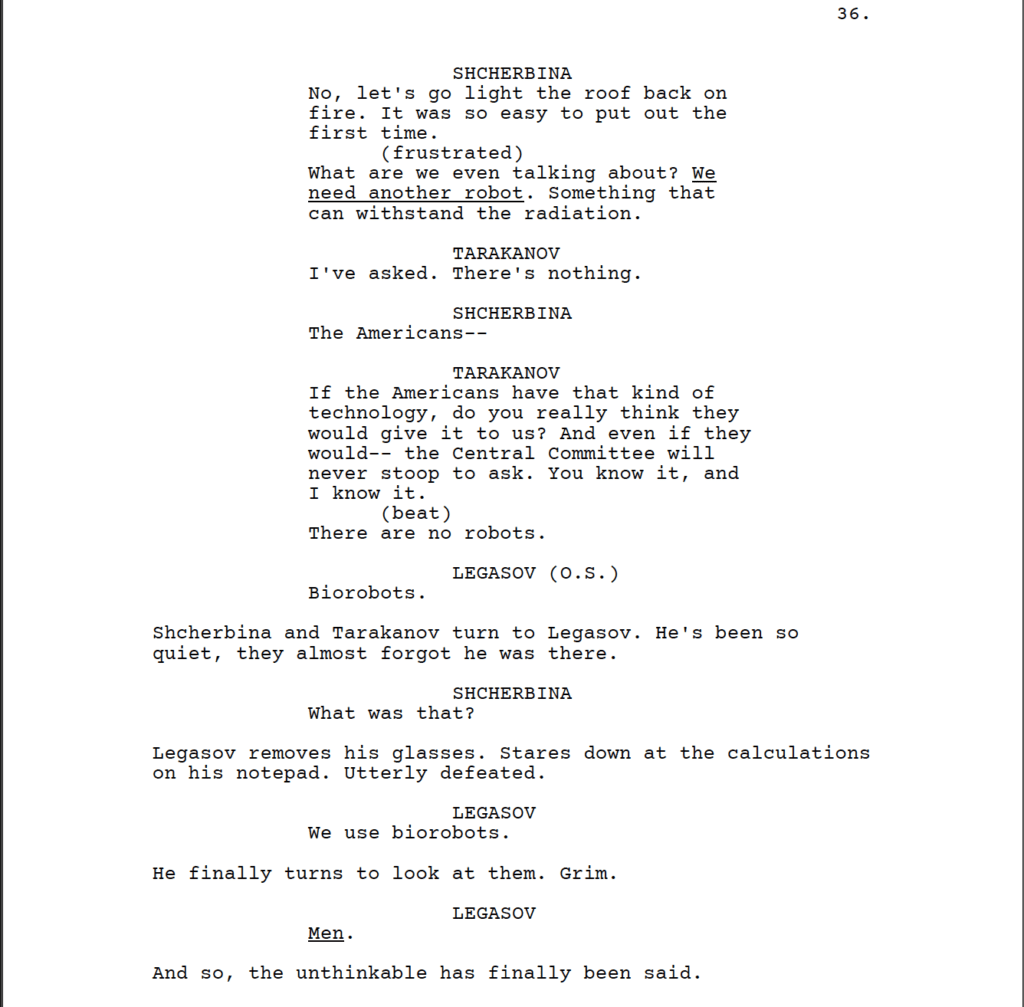
In this one scene the plot progresses from: the trio needs to find a way to remove debris from the roof and ultimately stop the leaking radiation...to...these are various solutions that won't work...to..they must send men to one of the most deadly places on earth to get the job done. The plot has progressed to the most unthinkable yet final option.
Imagine if the entire scene was just the men talking about how grim the situation was and how badly they needed a solution. That would cause the plot to become stagnant. So, put your own script through the test. Are there any portions of dialogue that cause the plot to halt? What needs to be edited? What can be removed? What conversations would move the story forward?
Feel Authentic and Dynamic
One of the most difficult aspects of dialogue to craft is that which feels authentic. Whether it's a soldier from the 1700s or a banker from the 21st century, it must sound real. Do your research - how do the people you're writing about actually sound? Take a look at this small conversation reflecting the 1840s in 12 Years a Slave.
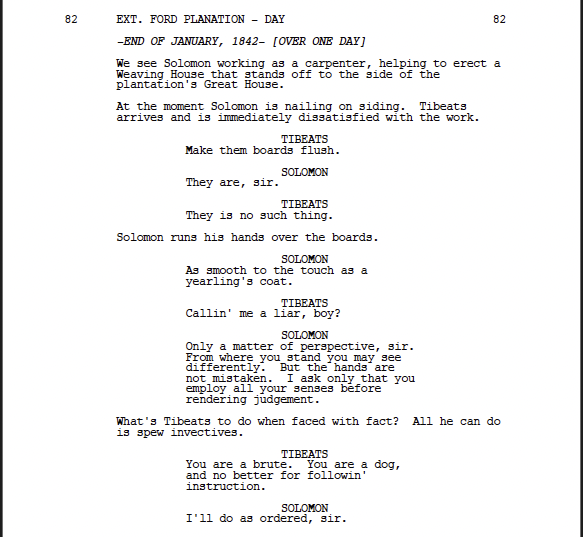
The dialogue in this scene perfectly reflects the time. It sounds authentic, but it's also dynamic. It bounces back and forth, escalating as the scene progresses. Throughout your script, you want dialogue that is short, carries a punch, and creates conflict.
Carry Subtext
Execs love subtext. In Creating Unforgettable Characters, Seger defines subtext as "what the character is really saying between and beneath the lines." For example, this is perfectly demonstrated and bluntly revealed to us in The Princess Bride...
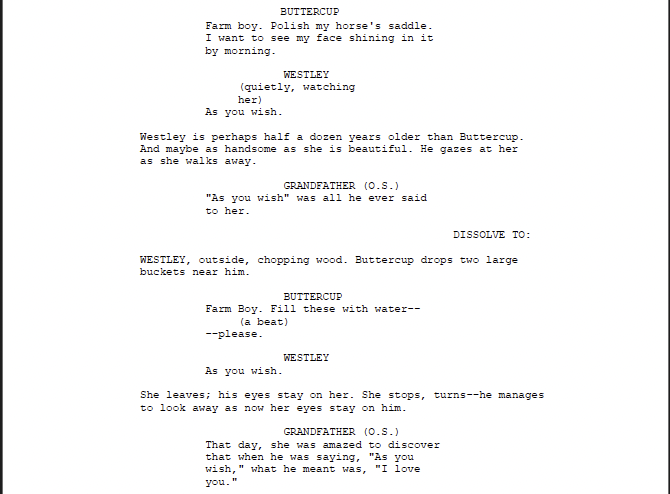
Notice that last line. There was a difference between what Westley was saying and what he meant. Introducing subtext into your script boosts the depth of both your plot and your characters - which is something producers certainly admire.
Here's another example from Jojo Rabbit...
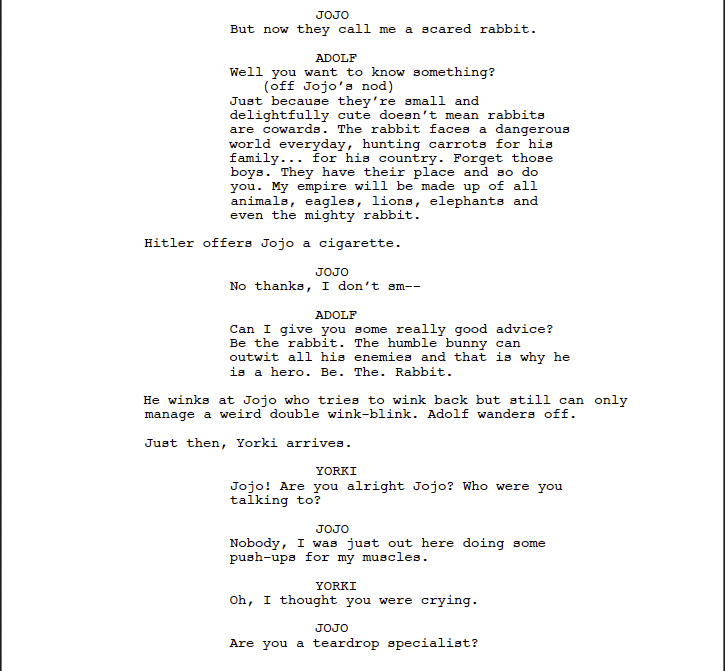
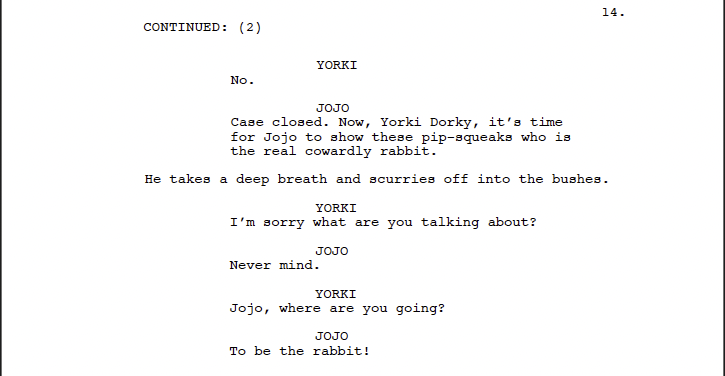
First we look at the context: Jojo has been made fun of by other kids because he refused to kill a rabbit, and his mental portrayal of Hitler says that being a bunny is actually a good thing. So, the subtext arrives in the last line when Jojo scurries off "To be the rabbit!" Jojo doesn't mean he's literally going to be a hopping fur ball. He means he is going to take on the new portrayal of the bunny that his hero has described.
Dialogue that Doesn't Exist
Ironically enough, dialogue that executives are looking for is sometimes the lack thereof. Just like in life, you need to know when to say something, and when not to.
Since film is a visual medium, it is more powerful when something is communicated visually rather than audibly. For example, you could have a character talk about how he is angry - or you could visually show that he is angry. Here's a general rule of thumb: if there is a way for you to naturally communicate something without using dialogue, do it! For example, look back at this scene from Chernobyl...


Following Legosov's comment at the end of page 34, it makes sense that Scherbina waves him off (a visual gesture), but it would be unnatural for him not to say anything given the situation. The conversation would feel awkward. Therefore, it is appropriate that dialogue is inserted ("Yes, okay, I remember"), rather than just have him react visually and not say anything.
On the other hand, a few lines down when Tarakanov asks Scherbina, "Are you serious?" we don't have to hear Scherbina say, "Yes, I'm serious." All he needs is a look that demonstrates what he's thinking, and everything is perfectly and naturally communicated given the situation and his personality.
Therefore, this practice of "show, don't tell" is an extremely important tool - especially in an industry that is rife with scripts that bear unneeded dialogue.
Fade Out:
Nailing down the dialogue in a script can be tricky. But if done well, it could be a key element in bringing you to the table of an exec or the finals of a screenwriting competition. In fact, if you excel at writing dialogue (in conjunction with other items), a production company may pass on one of your scripts but still consider working with you on another project (i.e. asking to read another one of your scripts, giving you a writing assignment, etc.) because they like your chops. So, study writers who excel in this area. Analyze projects that execute scenes full of dialogue well. And be sure to keep on writing. As they say: practice makes perfect, and that is the best way to become someone who writes dialogue that producers are looking for.



